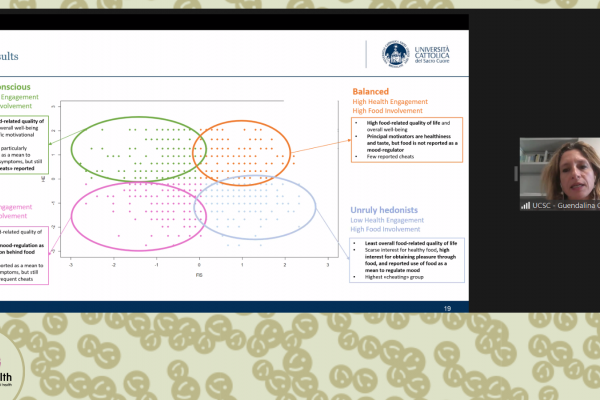miGut-Health Studies: Professor Guendalina Graffigna Sheds Light on the Complex Relationship between Food Choices, Mood, and Health Engagement
On 7 February, Guendalina Graffigna (EngageMinds HUB – UCSC) held a presentation on "Preliminary Data on the Relationship between Health Engagement, Mood and Food Choices" at our first consortium call of the new year. Her presentation drew on three recent studies conducted as part of miGut-Health team member Dr Lorenzo Palamenghi's (UCSC) PhD dissertation.
While poor adherence to dietary restrictions often is reported in literature, few studies focus on the socio-psychological and emotional consequences of food restrictions. Food, after all, goes beyond nutritional values, but holds deeper societal and cultural meanings.
Hence, the first study aimed to delve deeper into how food restrictions (i.e. healthier diet) impact the psychosocial well-being of consumers — in this case, IBD patients.
A scoping review to understand the roots of food-related misbehaviour found that:
a) "cheating", i.e. avoiding the prescribed diet, is very common among IBD patients, sometimes as a means to feel 'normal'; b) planning meals is time-consuming and distressing, while trial-and-error approaches cause anxiety and non-adherence; c) dietary restrictions affect patient's social lives, with patients sometimes avoiding food-related gatherings to prevent complications; d) one person's dietary restrictions can affect the whole family's dietary habits, leading to feelings of exclusion or guilt.
The second study profiled patients according to their levels of health engagement and food involvement to identify patterns of different motives behind food choices and tendencies to "cheat".
Four clusters emerged with the following key findings:
Clusters of patients with a higher health engagement (HI) show a better quality of life, mood, and clinical condition. High HE combined with high Food Involvement (FI) allows for enjoyment of food without "cheats". However, patients with a high FI but a low HE are at a higher risk: they seek pleasure through food, but struggle to change their behaviour, which leads to frequent "cheats" and the use of food to regulate mood swings.
Finally, the third study assessed whether consumers with different psychological characteristics preferred different foods when their mood was deliberately lowered. Some of the main findings from the study based on 26 participants are that: a) food involvement is related to physiological activation (arousal) at the sight of food; b) this activation only happens with participants who do not show an engagement towards health in general, or towards healthy eating in particular. These results suggest that low-health-engaged people might be more prone to be "guided by emotions" in food choices.
The UCSC team's literature findings indicate that psychosocial factors as well as dietary and environmental related factors should be considered throughout the onset and course of IBD. It is important to take into account all these risk factors concomitantly to understand that people who share similar psychological, food-related and/or environmental conditions may be at higher risk of developing the disease compared to the general population. This forms a theoretical basis for the upcoming survey in miGut-Health, in which the UCSC team will test 8 hypotheses for IBD patients and high-risk individuals as well as 8 hypotheses for healthy individuals.
We are excited to find out more!



